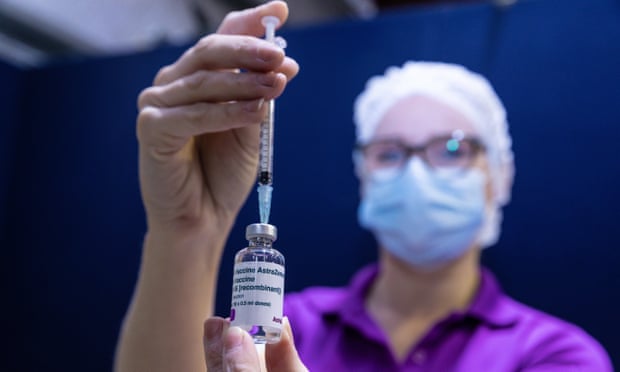More clotting cases probably linked to AstraZeneca, as NSW looks for Covid ‘missing link’
Australia’s drugs regulator has confirmed five more cases of a rare clotting condition are likely linked to the AstraZeneca Covid-19 vaccine, taking the country’s tally to 11 cases.
The head of the Therapeutic Goods Administration (TGA), Prof John Skerritt, said the cases included a 74-year-old man and a 51-year-old woman in Victoria, a 66-year-old man in Queensland, a 64-year-old woman in Western Australia and a 70-year-old man in Tasmania.
They have developed the rare and severe clotting condition called thrombosis with thrombocytopenia syndrome (TTS), which is being investigated by regulators worldwide after it was linked to the vaccine. The new TTS cases bring the total in Australia to 11, including one death: a 48-year-old woman in NSW who was vaccinated on 8 April.
Skerritt said the five new cases reported in the past week were recovering, with only one person still in hospital but “doing quite well”. Two were already back at work, he said.
Skerritt said the TGA was not surprised by the new cases. “I would say the rates in Australia are very similar to those both publicly and confidentially reported to us in places like Canada, the UK and continental Europe,” he said.
Many of the TTS cases had “quite serious and significant underlying health conditions” but it was too early to say whether they were a factor in the development of the clots.
In a statement issued on Thursday afternoon, AstraZeneca said patient safety was its highest priority.
“Tens of millions of people have now received our vaccine across the globe,” the company said. “The extensive body of data from two large clinical datasets and real-world evidence demonstrate its effectiveness, reaffirming the role the vaccine can play during this public health crisis.”
Meanwhile, health authorities in New South Wales are racing to find the “missing link” between a returned overseas traveller and a man diagnosed with Covid-19 in the community, as new restrictions were announced for the greater Sydney area.
On Thursday the state’s chief health officer, Dr Kerry Chant, said laboratory testing had revealed the community case of a man in his 50s who returned a positive test on Wednesday matched a case who travelled to the state from the US and quarantined at the Park Royal hotel at Darling Harbour, before being moved to Sydney health accommodation on 28 April.
But Chant said contact tracers had not identified any location where the pair could have come in contact with each other or any other direct link between the two cases.
“What we’re concerned about is there is another person that is as yet unidentified that infected our [community] case,” she said. “We sometimes never find a missing link.”
The wife of the community case has since tested positive, but nine other close contacts have not.
The premier, Gladys Berejiklian, said in response that from 5pm Thursday until 12.01am Monday, restrictions would be implemented in greater Sydney including Wollongong, the Central Coast and Blue Mountains, with visitors to households limited to 20 guests, and masks made compulsory on public transport and in all public indoor venues.
Drinking while standing up at indoor venues will not be allowed, and visitors to aged care facilities will be limited to two people. Dancing will not be allowed at indoor hospitality venues or nightclubs, however dancing is allowed at weddings.
“We know that at least one person has been going around greater Sydney with the virus, we don’t know who they are, we don’t know who they’ve been in contact with, we don’t know where they’ve visited, so as a precaution we’re just asking everybody to use their common sense, wear masks when shopping, wear masks if you’re in an indoor setting and just be safe,” Berejiklian said.
“It’s a very proportionate response. In fact, in other states they would have locked down the whole city, they would have closed businesses, they would have stopped events, they would have said you can’t dance at weddings. We’re not doing any of that.”
CCTV footage was being reviewed to look for clues as to how transmission between the overseas traveller and community case occurred, Chant said.
“As you can imagine, there’s strict procedures around the person being admitted to the quarantine facility and then transferred to our health quarantine facility,” she said. “We can’t find any direct link. What we’ve also identified is because this person arrived on 26 April, it really allows us to narrow down the time that our [community] case was exposed.”
The man was most likely infected at the end of April, she said.
Chant urged anyone in NSW with even mild symptoms to come forward for testing. Virus fragments had been detected in Marrickville sewage, and she said the missing link “made us even more heightened in our concern about sewage detections”.
Those living in suburbs linked to the sewage system – including Dulwich Hill, Marrickville, Summer Hill, Lewisham, Ashfield, Haberfield, Petersham, Lilyfield and Leichhardt – should be extra vigilant for symptoms, she said.
“While my message is to anyone with the most minimal of symptoms to come forward and get tested, we’re particularly calling out those suburbs because of that detection.”
The Queensland health minister, Yvette D’Ath, said on Thursday that anyone who arriveed in Queensland from a NSW exposure site from 1am Friday would need to stay in hotel quarantine.
“We will have police and health workers meeting flights coming in to Queensland to just check with passengers whether they have been at those venues,” she said.
“We believe this is a sensible restriction at this time.”

